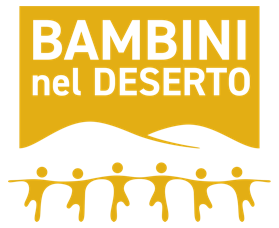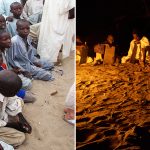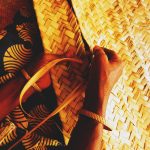Most of us are hostages of fate. Just like Johnson, who was driven out as a child by the civil war in Liberia to Ghana with his family in a refugee camp. His mother and his son are now in the United States where he himself had landed a few years ago as an ‘unwanted’. After the first civil war in his country he emigrated to Senegal and after some time, by plane, he landed in Jamaica of Bob Marley of the Rasta movement. From there he landed in Mexico. He too, like thousands of other migrants, had crossed the wall that separates the two countries and spent at least six months in Washington. Just enough time to give him a ‘World Passport’ to send it back to the sender, that is, Senegal. He passes through Guinea and, with the idea of going to Europe, tries in vain to reach Libya. He never managed to cross the border. For over 6 years Niger has become his homeland. He spends a few months as a guest in the Niamey Arrest House and, as soon as he leaves, he asks his now elderly mother to send him the money for his suitcases for the trip. While waiting he repairs chairs for the coming day of returning to a home that doesn’t exist. Even our borders are held hostage by the West and Local Accomplices. Offered for sale through outsourcing for the control of migrants, they have long been at the mercy of the balance of power that governs the geopolitics of the moment. Object of sale for trafficking of all kinds, smugglers, bandits, jihadists, businessmen, arms dealers and those who, thanks to them, get rich. For example EUCAP-SAHEL, specialized to train agents who manage borders. They prove deadly at sea, in the desert, in the heads and policies of those who hold the power to decide between those covered up, submerged, crucified and saved. Borders of sand, concrete, stone, barbed wire, electric, virtual or waste paper and await, perhaps, the new health passport. Borders ensure the protection of the inequalities mentioned in the latest OXFAM report, published on the occasion of the ‘virtual’ Davos Forum, for the Great Global Reset. However, the main hostages remain the poor. Under every regime, latitude or season, they are the ones who remain the ‘sales’ of agreements, policies, restructuring plans or major transformations of the economy. Irreplaceable for Humanitarian Agencies, street preachers of armed violence and religion as an organized substitute for illusions, are also fundamental for politicians seeking elective mandates. It is the poor hostages who guarantee its survival and above all its perpetuation. They present themselves as inevitable for ideologies, reserve armies, street demonstrations, soup kitchens, long-distance adoptions, humanitarian corridors and emergency funds for floods. Hostages chosen and therefore cared for, objects of study, investigations and countless measures to ensure a delocalized workforce, to be exploited in every crisis of the system. If they didn’t exist, they would have to be invented and this is precisely what the updated statistics of the latest censuses financed by the World Bank do. They are also hostages of the crudest forms of power, women, who in the intention of those who oversee the reins of societies, exist to reproduce, maintain and ensure the continuity of the world as conceived by them. Objects for use, consumption, exchange, advertising, market, comfort or simply pastime or prestige. Hostages of fashions, visions, promises, betrayals and traps into which they themselves sometimes fall due to naivety or interest. Policies deceive them, deceive them and make them an instrument of quotas for the administrations of banks or ministries of defense. Yet they work the land, sustain life, carry the weight of the days on their shoulders with the children who grow up with them, patiently waiting for a better tomorrow. They will be the only ones who can change the world in their own way, when, on any given day, they otherwise exercise a power other than that of dominating and excluding. Then there are the young people, hostages of defunct mentalities and of the future that escapes them because it has been stolen or betrayed by the adults. They are the disputed and contested voters of the second rounds of the presidential elections, hostages of money and alliances that no one believes in. Civil society is then held hostage by chasing donors, partners, funding and benevolent humanists. Hostages are the farmers in the areas occupied by the armed groups and the faithful who cannot profess the faith that inspires them. The privileged hostages are the intellectuals, in the pay of the powerful and the fear of thinking. Above all, words seduced and enslaved to lies are hostage. The only one who remains free to invent, act, teach and believe is still and only her, the sand of which, in the Sahel, we are all hostages.
Father Mauro Armanino was born in Chiavari in 1952. Already a worker and trade unionist for the FLM in Casarza Ligure, he left as a volunteer for the Ivory Coast to replace his military service. He was ordained a missionary priest at the Society of African Missions of Genoa and became chaplain to young people in the Ivory Coast until 1990. After a few years in Cordoba in Argentina he left for Liberia where he remained for seven years. Here he knows the war and the refugee camps. Upon returning from this experience he worked in the historic center of Genoa with migrants and as a volunteer in the Marassi prison for foreigners. For over ten years he has been in Niamey, the capital of Niger, for training activities in favor of migrants.


